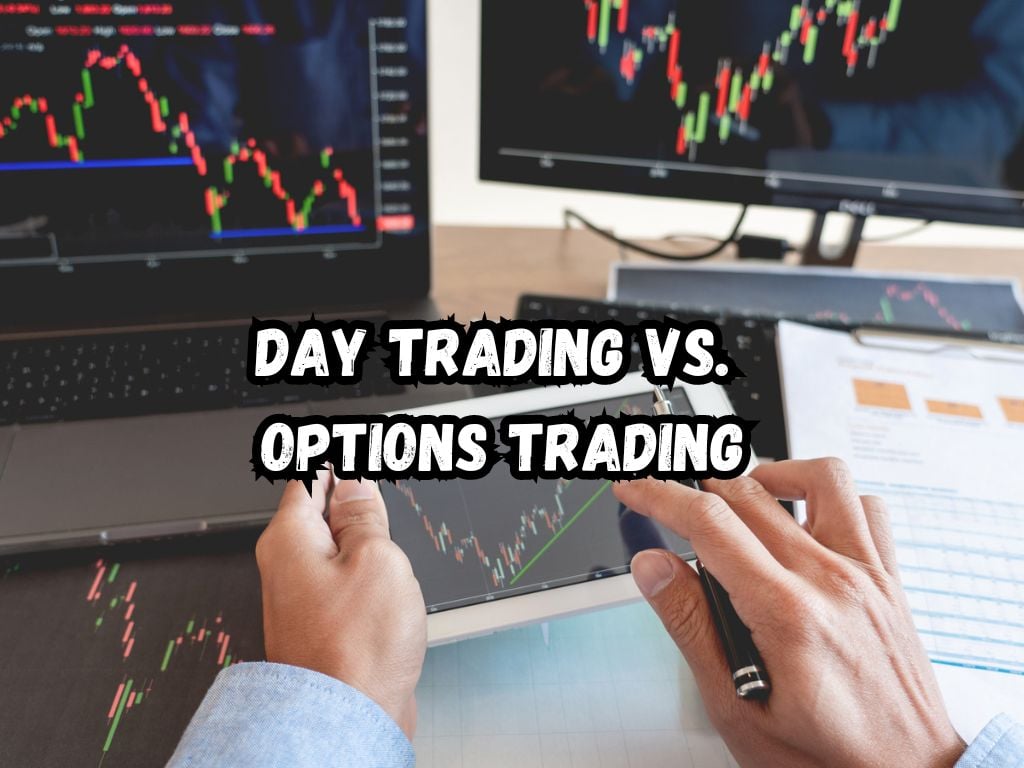When venturing into the vast world of trading, investors find themselves at a critical juncture.
Choosing between day trading and options trading marks the initial step towards crafting a strategy that aligns with one’s financial goals, risk tolerance, and lifestyle.
This guide aims to dissect the core attributes of day trading vs options trading, shedding light on their differences, advantages, and ideal trader profiles.
What is Day Trading?
Day trading involves buying and selling financial instruments within the same trading day. Traders capitalize on short-term market movements to secure profits.
This strategy applies to various assets, including stocks, currencies, and futures. Day traders thrive on volatility and liquidity, seeking to profit from swift price changes.

What are Options and Options Trading?
Options trading revolves around contracts that grant the buyer the right, but not the obligation, to buy or sell an underlying asset at a predetermined price before the contract expires.
Options traders can speculate on market direction or hedge existing positions against potential losses, providing a flexible strategy that can adapt to various market conditions.
Day Trading vs Options Trading
Time Investment
Day trading demands constant market attention during trading hours to monitor and respond to rapid price fluctuations. It’s a full-time commitment.
Conversely, options trading can be more flexible, allowing traders to set up trades and then monitor them periodically.
Capital Requirements
Generally, day trading requires a substantial initial investment due to the need for significant leverage and the potential for rapid gains or losses.
Options trading, on the other hand, may require less capital upfront, as the cost of an option is typically lower than buying the underlying asset outright.
Risk and Reward Profiles
Day trading carries a high level of risk and the potential for rapid financial loss, especially for those new to trading.
Options trading also involves risks, particularly the complete loss of the trade’s premium, but offers the strategic advantage of predetermined risks.
Market Conditions and Volatility
Market volatility fuels day trading success, as significant price movements are crucial for profit.
In options trading, volatility can affect option prices but doesn’t necessarily dictate the strategy’s success, offering a broader range of tactical plays regardless of market direction.
Liquidity Considerations
For day traders, liquidity is paramount to enter and exit positions quickly. Options trading might face challenges with liquidity, especially for less popular options or those with distant expiration dates.
Strategic Complexity
Options trading introduces a higher degree of complexity than day trading, given the various strategies (such as spreads, straddles, and strangles) that require a deep understanding of the Greeks (Delta, Gamma, Theta, Vega).
Pros and Cons
Day trading offers the allure of quick profits and hands-on market engagement, but it carries a higher risk of loss. It demands constant vigilance and can induce stress.
Options trading provides flexibility and defined risk, but the complexity of strategies and the potential for total premium loss must be navigated carefully.
Who Should Choose Day Trading?
Day trading suits individuals who can dedicate full-time hours to market monitoring, possess quick decision-making abilities, and have a high tolerance for risk.
An effective day trader remains disciplined, minimizes losses, and constantly learns from the day’s trades.
Who Should Choose Options Trading?
Options trading appeals to those who prefer strategic planning over speedy executions, wish to define their risk exposure, and seek to leverage their market knowledge with a more modest capital investment.
It requires patience, a systematic approach to learning, and an appreciation for detail.

Integrating Day and Options Trading into Your Portfolio
Achieving a balanced trading approach might involve combining day and options trading.
Such a strategy can diversify risk while capitalizing on different market conditions and personal strengths.
Effective risk management and a keen understanding of both arenas are essential for this hybrid approach.
Getting Started
Success in day or options trading begins with education. Selecting reputable platforms for analysis tools, real-time data, and demo trading can facilitate this.
Both beginners and seasoned traders benefit from continuous learning through courses, webinars, and reading materials focused on market psychology and trading techniques.
Legal and Regulatory Considerations
Awareness of the legal landscape and adherence to regulatory requirements are paramount.
This includes understanding the pattern day trader rule, margin requirements for day trading, and specific obligations related to options trading disclosure and qualifications.
Engaging with a financial advisor or legal professional can help navigate these waters smoothly.
Frequently Asked Questions
Is day trading or options trading more profitable?
Profitability depends on the trader’s skill, strategy, and market conditions. Both can be highly profitable or lead to significant losses.
Can options trading be done effectively with a full-time job?
Yes, options trading can be more accommodating for those with full-time jobs, thanks to its flexibility and the ability to plan trades in advance.
How significant is the impact of time decay in options trading?
Time decay (Theta) is a crucial factor in options pricing, affecting the value of options contracts as they near expiration. Understanding and managing Theta is essential for options traders.
What are the tax implications for day trading vs options trading?
Tax treatment varies by country and specific trading activities. Generally, day trading profits might be considered short-term capital gains, whereas options trading can encompass short-term and long-term gains depending on holding periods. Consulting with a tax professional is advisable.
Conclusion
Choosing between day trading and options trading pivots on personal attributes, lifestyle, and financial goals. Each path offers unique challenges and rewards, demanding dedicated study and practice.
Whether through the exhilarating pace of day trading or the strategic depth of options trading, success lies in a disciplined approach, continuous education, and an unwavering commitment to mastering the craft.


 Tags:
Tags:










